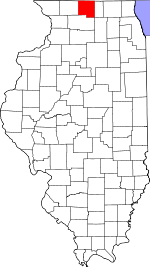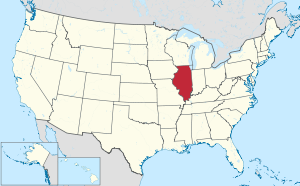Winnebago County, Illinois
County in Illinois, United States From Wikipedia, the free encyclopedia
Winnebago County is a county located in the U.S. state of Illinois. According to the 2020 census, it had a population of 285,350 making it the seventh most populous county in Illinois behind Cook County and its five surrounding collar counties. Its county seat is Rockford.[1] Winnebago County is the central county of the Rockford metropolitan area.
Winnebago County | |
|---|---|
 Winnebago County Justice Center | |
 Location within the U.S. state of Illinois | |
 Illinois's location within the U.S. | |
| Coordinates: 42°20′N 89°10′W | |
| Country | United States |
| State | Illinois |
| Founded | January 16, 1836 |
| Named after | Winnebago people |
| Seat | Rockford |
| Largest city | Rockford |
| Area | |
• Total | 519 sq mi (1,340 km2) |
| • Land | 513 sq mi (1,330 km2) |
| • Water | 5.9 sq mi (15 km2) 1.1% |
| Population (2020) | |
• Total | 285,350 |
• Estimate (2023) | 280,922 |
| • Density | 550/sq mi (210/km2) |
| Time zone | UTC−6 (Central) |
| • Summer (DST) | UTC−5 (CDT) |
| Congressional districts | 16th, 17th |
| Website | wincoil |
History
Summarize
Perspective
Winnebago County was formed on January 16, 1836, out of Jo Daviess and LaSalle counties. It was named for the Winnebago Tribe of American Indians. At the time the county was founded its inhabitants consisted almost entirely of New Englanders and New England transplants from upstate New York.[2] These were "Yankee" settlers, meaning they were descended from the English Puritans who settled New England during the early 1600s. They made up virtually all of Winnebago County's inhabitants during the first several decades of its history. In this regard the county was similar to most of the northern portion of the state of Illinois, and almost all of the neighboring state of Wisconsin. After the conclusion of the Black Hawk War there was an additional surge of immigration from New England. As a result of this heritage the inhabitants of Winnebago County considered themselves, and functioned as, a cultural expansion of early New England culture.[3] In the presidential election of 1860, Abraham Lincoln won 3,985 votes in Winnebago County, whereas Stephen A. Douglas only won 817 votes.[4]
- Winnebago County for its first year of existence
- Winnebago County in 1837, reduced to its current borders by the creation of Stephenson and Boone Counties
Geography
Summarize
Perspective
According to the U.S. Census Bureau, the county has a total area of 519 square miles (1,340 km2), of which 513 square miles (1,330 km2) is land and 5.9 square miles (15 km2) (1.1%) is water.[5]
Climate and weather
| Rockford, Illinois | ||||||||||||||||||||||||||||||||||||||||||||||||||||||||||||
|---|---|---|---|---|---|---|---|---|---|---|---|---|---|---|---|---|---|---|---|---|---|---|---|---|---|---|---|---|---|---|---|---|---|---|---|---|---|---|---|---|---|---|---|---|---|---|---|---|---|---|---|---|---|---|---|---|---|---|---|---|
| Climate chart (explanation) | ||||||||||||||||||||||||||||||||||||||||||||||||||||||||||||
| ||||||||||||||||||||||||||||||||||||||||||||||||||||||||||||
| ||||||||||||||||||||||||||||||||||||||||||||||||||||||||||||
In recent years, average temperatures in the county seat of Rockford have ranged from a low of 11 °F (−12 °C) in January to a high of 83 °F (28 °C) in July, although a record low of −27 °F (−33 °C) was recorded in January 1982 and a record high of 112 °F (44 °C) was recorded in July 1936. Average monthly precipitation ranged from 1.34 inches (34 mm) in February to 4.80 inches (122 mm) in June.[6]
Major highways
Transit
- Beloit Transit
- Rockford Mass Transit District
- List of intercity bus stops in Illinois
Adjacent counties
- Rock County, Wisconsin (north)
- Boone County (east)
- DeKalb County (southeast)
- Ogle County (south)
- Carroll County (southwest)
- Stephenson County (west)
- Green County, Wisconsin (northwest)
Demographics
Summarize
Perspective
| Census | Pop. | Note | %± |
|---|---|---|---|
| 1840 | 4,609 | — | |
| 1850 | 11,773 | 155.4% | |
| 1860 | 24,491 | 108.0% | |
| 1870 | 29,301 | 19.6% | |
| 1880 | 30,505 | 4.1% | |
| 1890 | 39,938 | 30.9% | |
| 1900 | 47,845 | 19.8% | |
| 1910 | 63,153 | 32.0% | |
| 1920 | 90,929 | 44.0% | |
| 1930 | 117,373 | 29.1% | |
| 1940 | 121,178 | 3.2% | |
| 1950 | 152,385 | 25.8% | |
| 1960 | 209,765 | 37.7% | |
| 1970 | 246,623 | 17.6% | |
| 1980 | 250,884 | 1.7% | |
| 1990 | 252,913 | 0.8% | |
| 2000 | 278,418 | 10.1% | |
| 2010 | 295,266 | 6.1% | |
| 2020 | 285,350 | −3.4% | |
| 2023 (est.) | 280,922 | [7] | −1.6% |
| U.S. Decennial Census[8] 1790–1960[9] 1900–1990[10] 1990–2000[11] 2010–2019[12] | |||
| Race / Ethnicity (NH = Non-Hispanic) | Pop 2000[13] | Pop 2010[14] | Pop 2020[15] | % 2000 | % 2010 | % 2020 |
|---|---|---|---|---|---|---|
| White alone (NH) | 220,817 | 214,196 | 183,235 | 79.31% | 72.54% | 64.21% |
| Black or African American alone (NH) | 29,038 | 35,358 | 38,240 | 10.43% | 11.97% | 13.40% |
| Native American or Alaska Native alone (NH) | 584 | 563 | 559 | 0.21% | 0.19% | 0.20% |
| Asian alone (NH) | 4,719 | 6,722 | 7,938 | 1.69% | 2.28% | 2.78% |
| Native Hawaiian or Pacific Islander alone (NH) | 76 | 61 | 66 | 0.03% | 0.02% | 0.02% |
| Other race alone (NH) | 216 | 319 | 1,099 | 0.08% | 0.11% | 0.39% |
| Mixed race or Multiracial (NH) | 3,762 | 5,870 | 13,261 | 1.35% | 1.99% | 4.65% |
| Hispanic or Latino (any race) | 19,206 | 32,177 | 40,952 | 6.90% | 10.90% | 14.35% |
| Total | 278,418 | 295,266 | 285,350 | 100.00% | 100.00% | 100.00% |
As of the 2010 census, there were 295,266 people, 115,501 households, and 76,854 families residing in the county.[16] The population density was 575.2 inhabitants per square mile (222.1/km2). There were 125,965 housing units at an average density of 245.4 per square mile (94.7/km2).[5] The racial makeup of the county was 77.4% white, 12.2% black or African American, 2.3% Asian, 0.3% American Indian, 4.9% from other races, and 2.8% from two or more races. Those of Hispanic or Latino origin made up 10.9% of the population.[16] In terms of ancestry, 25.6% were German, 13.5% were Irish, 9.4% were American, 8.7% were Swedish, 8.3% were English, and 7.4% were Italian.[17]
Of the 115,501 households, 33.1% had children under the age of 18 living with them, 47.3% were married couples living together, 14.0% had a female householder with no husband present, 33.5% were non-families, and 27.7% of all households were made up of individuals. The average household size was 2.52 and the average family size was 3.07. The median age was 38.3 years.[16]
The median income for a household in the county was $47,198 and the median income for a family was $59,814. Males had a median income of $48,358 versus $32,103 for females. The per capita income for the county was $24,008. About 11.5% of families and 15.9% of the population were below the poverty line, including 25.0% of those under age 18 and 7.5% of those age 65 or over.[18]
Communities
Cities
Villages
Census-designated place
Unincorporated communities
Townships
Winnebago County is divided into these townships:
Politics
Summarize
Perspective
For many years, Winnebago County was rather conservative for an urban county. From the 1850s to 1988, it backed the Republican candidates for president at every election except the national Democratic landslides of 1936 and 1964. In the 1990s, it became a swing county, backing the national winner in every presidential election from 1992 to 2012, though only three did so with a majority and only once by more than six percentage points. In 2016, Hillary Clinton won the county by only 89 votes over Donald Trump, affected by the relatively large third-party vote that year.
Underlining how Republican Winnebago County once was, only three Democrats have represented a significant portion of the county in Congress since the 1850s.
| Year | Republican | Democratic | Third party(ies) | |||
|---|---|---|---|---|---|---|
| No. | % | No. | % | No. | % | |
| 2024 | 59,257 | 48.56% | 59,942 | 49.13% | 2,819 | 2.31% |
| 2020 | 60,861 | 47.49% | 64,056 | 49.98% | 3,243 | 2.53% |
| 2016 | 55,624 | 46.33% | 55,713 | 46.41% | 8,718 | 7.26% |
| 2012 | 55,138 | 46.18% | 61,732 | 51.70% | 2,527 | 2.12% |
| 2008 | 53,886 | 42.53% | 70,034 | 55.27% | 2,784 | 2.20% |
| 2004 | 60,782 | 50.06% | 59,740 | 49.20% | 903 | 0.74% |
| 2000 | 53,816 | 49.24% | 51,981 | 47.56% | 3,500 | 3.20% |
| 1996 | 44,479 | 44.52% | 46,264 | 46.31% | 9,167 | 9.18% |
| 1992 | 42,221 | 37.63% | 48,298 | 43.04% | 21,696 | 19.33% |
| 1988 | 55,699 | 54.85% | 45,280 | 44.59% | 571 | 0.56% |
| 1984 | 64,203 | 58.66% | 44,629 | 40.78% | 619 | 0.57% |
| 1980 | 48,825 | 46.46% | 32,384 | 30.82% | 23,880 | 22.72% |
| 1976 | 52,736 | 54.15% | 42,399 | 43.54% | 2,252 | 2.31% |
| 1972 | 57,682 | 61.46% | 35,937 | 38.29% | 231 | 0.25% |
| 1968 | 47,646 | 52.51% | 36,702 | 40.45% | 6,391 | 7.04% |
| 1964 | 39,920 | 44.98% | 48,834 | 55.02% | 0 | 0.00% |
| 1960 | 49,541 | 55.20% | 40,090 | 44.67% | 110 | 0.12% |
| 1956 | 48,332 | 62.38% | 29,063 | 37.51% | 89 | 0.11% |
| 1952 | 43,468 | 57.95% | 31,409 | 41.88% | 127 | 0.17% |
| 1948 | 29,537 | 51.54% | 27,145 | 47.36% | 631 | 1.10% |
| 1944 | 30,837 | 52.31% | 27,831 | 47.22% | 277 | 0.47% |
| 1940 | 30,683 | 51.89% | 28,061 | 47.46% | 383 | 0.65% |
| 1936 | 24,997 | 46.30% | 27,200 | 50.38% | 1,792 | 3.32% |
| 1932 | 26,632 | 57.12% | 17,707 | 37.98% | 2,286 | 4.90% |
| 1928 | 33,258 | 80.39% | 7,684 | 18.57% | 430 | 1.04% |
| 1924 | 21,978 | 71.32% | 2,228 | 7.23% | 6,608 | 21.44% |
| 1920 | 19,913 | 79.23% | 3,355 | 13.35% | 1,866 | 7.42% |
| 1916 | 14,893 | 65.04% | 6,198 | 27.07% | 1,806 | 7.89% |
| 1912 | 2,537 | 21.32% | 2,276 | 19.12% | 7,089 | 59.56% |
| 1908 | 8,919 | 71.54% | 2,163 | 17.35% | 1,385 | 11.11% |
| 1904 | 8,143 | 74.80% | 1,177 | 10.81% | 1,567 | 14.39% |
| 1900 | 8,103 | 72.69% | 2,498 | 22.41% | 546 | 4.90% |
| 1896 | 8,242 | 75.10% | 2,447 | 22.30% | 286 | 2.61% |
| 1892 | 5,854 | 62.50% | 2,634 | 28.12% | 878 | 9.37% |
See also
References
Further reading
External links
Wikiwand - on
Seamless Wikipedia browsing. On steroids.



